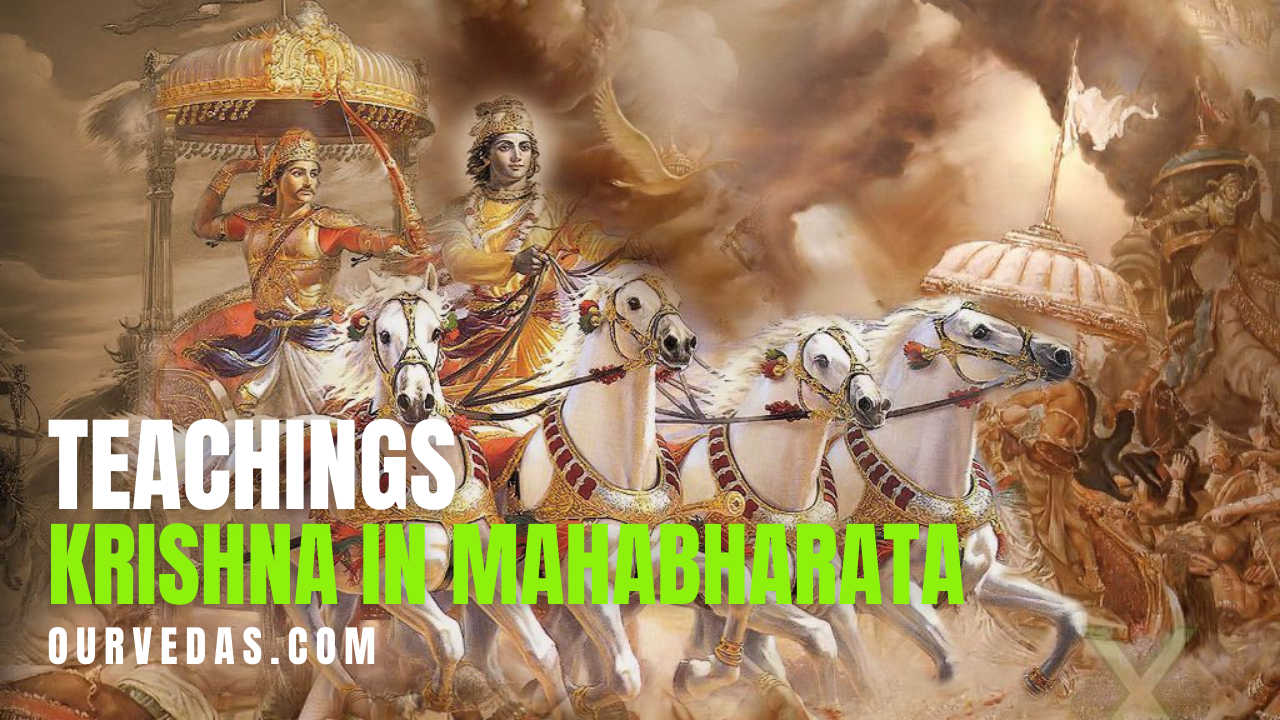The story of Mahabharata is rich with vast stories containing many life-changing lessons. Among the thousands of characters in the Mahabharata, the character of Lord Krishna stands out from others.
The teachings by Krishna in Mahabharata, especially those found in the Bhagavad Gita, remain relevant to this day. They shed light on reality and clear the fog of Maya from our brains.
In this article, we will discuss some teachings of Krishna that can really shape us to be better humans.
Teachings by Krishna in Mahabharata
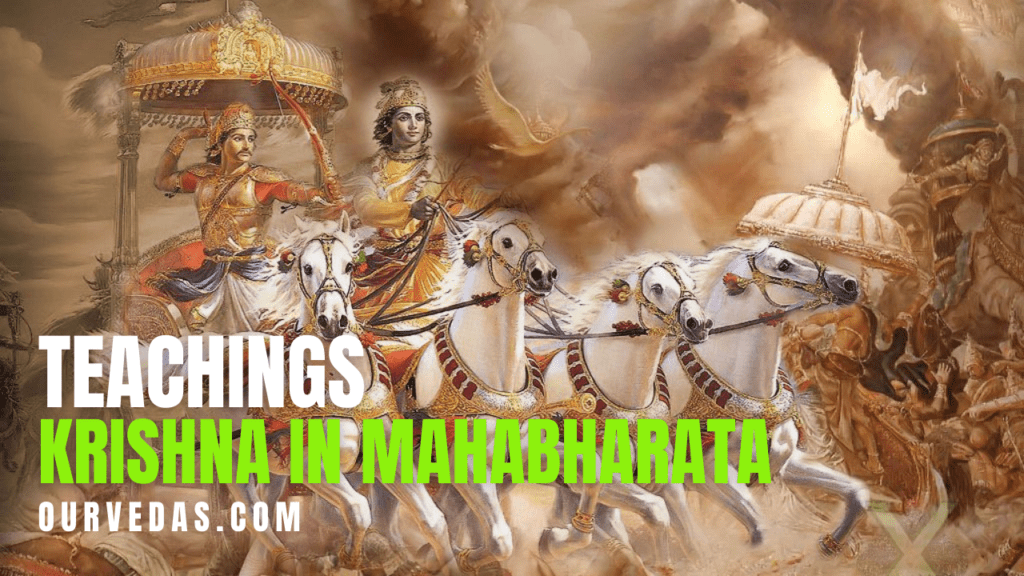
Arjun’s Dilemma
At the heart of the Mahabharata is the Kurukshetra War, where two factions of the same royal family—the Pandavas and the Kauravas—are poised for battle.
As the armies prepare to engage in combat, Arjuna, one of the Pandava brothers, instructs his charioteer, Lord Krishna, to drive their chariot to the centre of the battlefield so he can observe the opposing forces.
He found his friends, relatives, gurus, and elders he had always respected standing against him in the opposite clan. A realization suddenly dawns upon him that he would have to fight against his own kin which will lead to devastating consequences.
Arjuna said, “How can I fight against my own family? The thought of killing my relatives, teachers, and elders fills my heart with sorrow and compassion. I do not wish to engage in this battle that will result in such great loss of life. It is better for me to renounce and live as a beggar than to kill my own kin.”
Overwhelmed by compassion and doubt, he experiences a deep internal struggle and questions the righteousness of the war. Arjuna concludes that he cannot fulfil his duty as a warrior and expresses his desire to withdraw from the battle, laying down his bow and arrows.
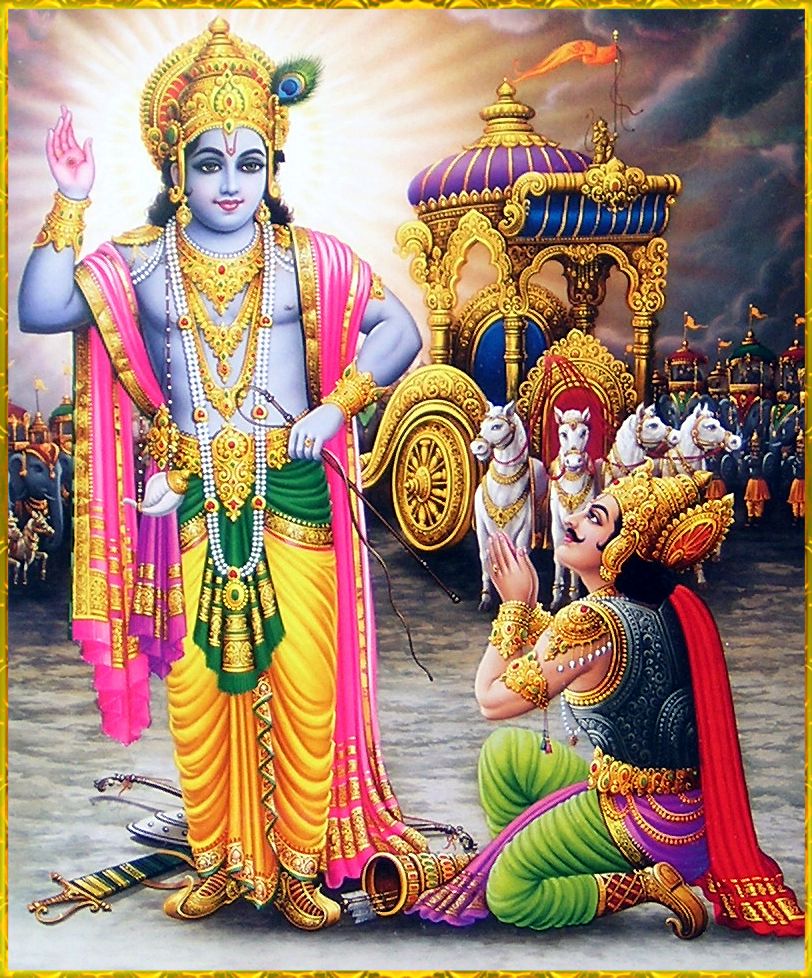
This sets up the stage for the profound dialogue between Krishna and Arjuna which will given us some grave life-lessons.
Teachings on The Nature of Duty (Dharma)
Krishna taught us the concept of Dharma, or one’s duty. Krishna emphasizes that it is essential to perform one’s duty without attachment to the results. He explains to Arjuna that as a warrior (Kshatriya), it is his responsibility to fight for righteousness (Dharma).
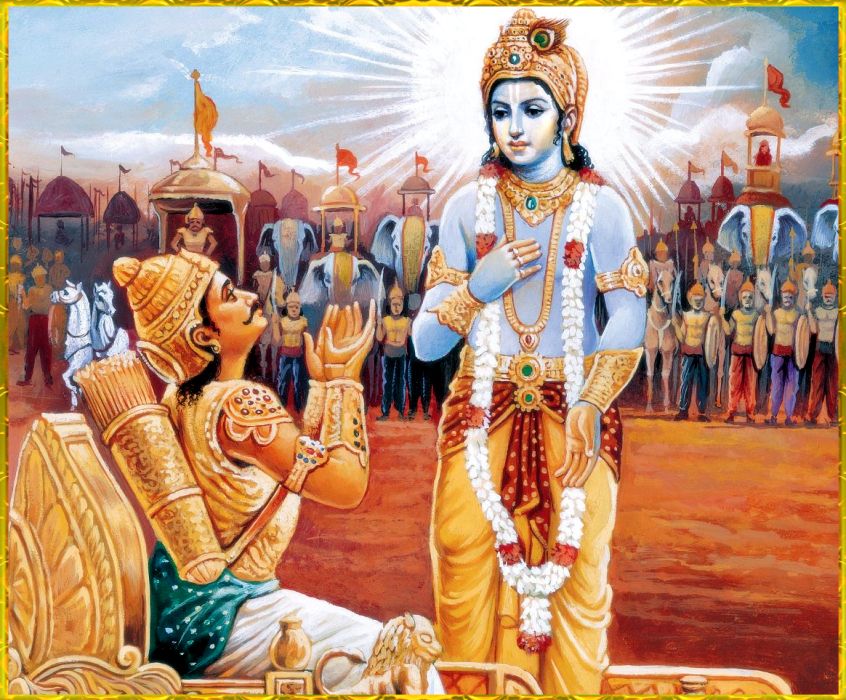
Krishna said, “You have the right to work, but never to the fruit of work.” He encourages us to do our duty without thinking about the result or what good or bad it may bring to us. He teaches us to always do the right Karma without attaching us to the final results.
You are not this body
Of the many teachings by Krishna in Mahabharata, this one stands out to be different. In the Gita, Krishna tells us about the source of energy in every body- Atman or soul. The soul is eternal or indestructible. It can neither be cut nor be drowned. It doesn’t feel heat or cold.
The soul has a transient nature. He explains that the physical body is temporary, while the soul is everlasting and beyond death. Just as a human changes clothes when they are useless, the soul changes bodies. Krishna said, “What are you afraid of! Your soul can neither die nor you can kill any soul.”
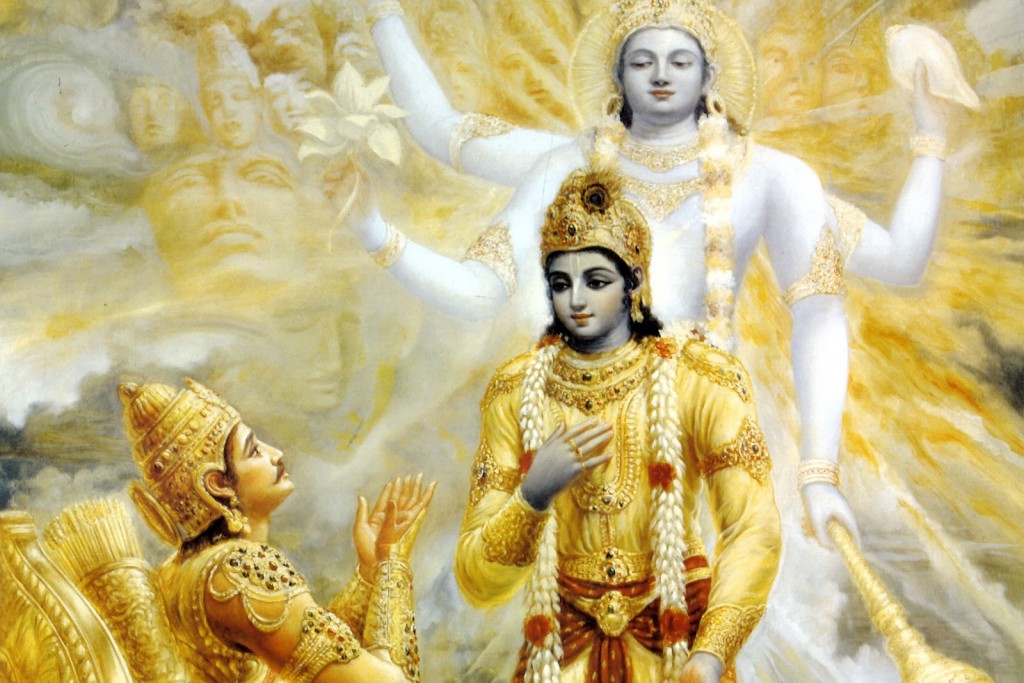
Usually, we are afraid of death and spend a lot of our energy ruminating about death. Krishna suggests us to be free of such worries and spend a life with joy. It’s not how long you lived, it’s about how profound Karmas you did in your life.
Selfless Action (Karma Yoga)
Krishna has given us a deep knowledge of Karma Yoga. It is the path of selfless action as a means of achieving spiritual growth and inner peace.
“O my dear Arjuna, true actions are not driven by desire for personal gain but rather by service to a greater purpose.”, said Krishna.
Krishna says that performing our actions selflessly, without any desire for rewards or recognition, frees us from the karma that those action bring with them. It purifies our hearts and leads to liberation (moksha).
Krishna urges individuals to act according to their responsibilities and Dharma while maintaining a sense of detachment from the fruits of their work. Krishna’s famous quote, “You have the right to work, but never to the fruit of work,” is the key to living a peaceful life.
This principle of selfless service involves acting for the greater good and the benefit of others. Krishna embodies this philosophy in his own life, serving as a charioteer for the Pandavas while guiding them selflessly.
Devotion and Surrender (Bhakti Yoga)
Krishna was an avatar of Lord Vishnu. He has given his devotees the simplest mantra to liberation in Bhagavad Geeta. Krishna had introduced the concept of Bhakti Yoga, the path of devotion.
“Surrender to me Parth(Arjuna)! Come to me and surrender all your desires, worries, sorrows to me.”, said Krishna.
This teaching encourages individuals to seek refuge in God during times of distress. In the Gita, Krishna reassures Arjuna, “Whenever righteousness wanes and unrighteousness increases, I incarnate and save my devotees.”
Since ancient times, whenever unrighteousness increased, Lord Vishnu has taken many avatars. From Matsya to Kalki, Lord Vishnu has always taken care of his devotees.
Krishna suggests we rid ourselves of unnecessary worries and surrender to the divine will. Krishna’s teachings on Bhakti Yoga highlight the transformative power of love and devotion to God. By surrendering to the divine will, cultivating unwavering faith, and nurturing a heartfelt connection, practitioners can attain profound peace and liberation.
The Role of Knowledge and Wisdom (Jnana Yoga)
Janana Yoga is the yoga of knowledge. Krishna emphasizes that knowledge, particularly self-knowledge is the key to breaking the shackles of ignorance. By shackles of ignorance, Krishna refers to the Maya. Maya has given us ego and duality. Our egos recognize us as male and female, but we are actually atman(soul).
Krishna encourages Arjuna to engage in self-inquiry to know the eternal truth. He highlights the importance of meditation(Dhyana) as a means to deep wisdom.
This process of self-exploration involves recognizing one’s thoughts and emotions. It will help us understand our autonomous behaviors.
Krishna says, “A person is considered wise when they see the same divine essence in all beings.” By this, he means that all life is interconnected, and we should look beyond these material differences.
Krishna said that one must develop an understanding of the truth. In doing so, individuals can transcend personal desires and ego-driven motivations and realize their true place in this universe.
Read: Gajasura Shiva Story
Forgiveness and Compassion
One of the teachings by Krishna in Mahabharata is that every individual has flaws and makes mistakes. It is the nature of human intelligence to be driven by senses and make mistakes. I is important to accept this human condition.
In the middle of battlefield, he encourages Arjuna to understand that those who may stand against us often act out of ignorance or misunderstanding. He says that it’s important to forgive your enemies.
Forgiveness can liberate oneself from the burdens of resentment and anger. He tells Arjuna that by holding grudges, one only harms himself. By forgiving others, we release negative emotions and create space for peace and positivity in our hearts.
We should look beyond our immediate emotions and mental turmoil. We must consider the bigger picture and understand that by holding negative emotions against anyone, we are karmically linking us to them. Therefore, we should choose harmony, compassion and love over revenge.
Value of Friendship
Krishna’s friendships, particularly with Arjuna and the Gopis (shepherd girls), has taught us the essence of true friendship. He taught that true friendship involves being there for one another, uplifting and guiding each other through life’s struggles.
One of the profound teachings by Krishna in Mahabharata is that love for friends should come with a readiness to act selflessly. Krishna’s actions, from risking his life for his friends to devising plans for their benefit, highlight how true friendship involves standing by one another, even at great personal cost.
Courage in the Face of Adversity
The natural human response is to avoid danger. But Krishna teaches us to be courageous in difficult times and stand our ground when the duty calls. He teaches us that one must perform his duty without thinking about the fruits it may bear.
He reminds Arjuna that hesitation and uncertainty are part of the human experience, but true courage lies in facing those feelings head-on. By acknowledging our fears, we can find the strength to act despite them.
One should surrender to the divine will and do his Karma. By understanding that our soul is eternal, we should be courageous in the face of adversity.
Conclusion
The teachings by Krishna in Mahabharata offer timeless wisdom that can guide the disoriented youth of today’s world.
The insights of Krishna about duty, soul, and the selfless action must be taught to each kid in their early childhood. These lessons will shape their lives and build a better society with strong values.
In a world deviating towards drug addictions and low morals, Krishna’s teachings can act as a beam of light. May Krishna guide us to him!
Read: Tulsi and Krishna Story

